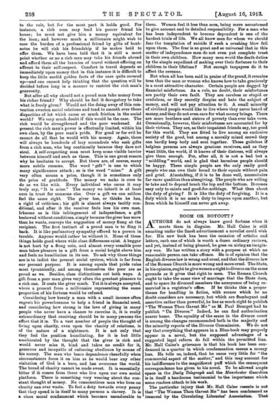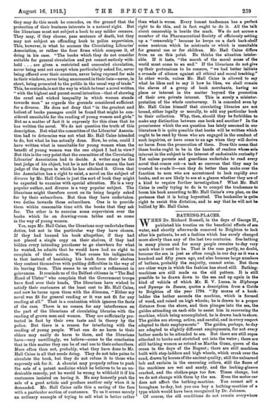BOOM OR BOYCOTT?
AUTHORS do not always know good fortune when it meets them in disguise. Mr. Hall Caine is still smarting under the finest advertisement a novelist could wish for. His new book has been the occasion of articles and letters, each one of which is worth a dozen ordinary reviews, and yet, instead of being pleased, be goes on airing an imagin- ary woe. He has written a story with a purpose at which no reasonable person can take offence. He is of opinion that the English divorce law is wrong and cruel, and that the divorce law of the Roman Church is more wrong and more cruel. The State, in his opinion, ought to give women aright to divorce on the same grounds as it gives that right to men. The Roman Church ought to take the same view of marriage that the State does, and to spare its divorced members the annoyance of being re-
married in a registrar's office. If he thinks this a proper theme for handling in fiction, with scenes which he no doubt considers are necessary, but which are flamboyant and assertive rather than powerful, he has as much right to publish " The Woman Thou Gayest Me " as M. Paul Bourget had to publish " Un Divorce." Indeed, he can find authorization nearer home. The equality of the sexes in the divorce court is among the changes recommended both in the majority and the minority reports of the Divorce Commission. We do not say that everything that appears in a Blue-book may properly appear in a novel, but the supposed advantages of a suggested legal reform do fall within the permitted line. Mr. Hall Caine's grievance is that his book has been con- demned in a quarter in which condemnation means a money loss. He tells us, indeed, that he cares very little for " the commercial aspect of the matter," and this may account for his indifference to the magnificent puff which the consequent correspondence has given to his noveL To be allowed ample space in the Daily Telegraph and the Manchester Guardian is in itself a handsome testimonial to the importance which some readers attach to his work.
The particular injury that Mr. Hall Caine resents is not that " The Woman Thou Gayest Me" has been condemned as immoral by the Circulating Libraries' Association. That they may do this much he concedes, on the ground that the protection of their business interests is a natural right. But the librarians must not subject a book to any milder censure. They may, if they choose, pass sentence of death, but they may not subject an offending book to police supervision. This, however, is what he accuses the Circulating Libraries' Association, or rather the four firms which compose it, of doing in his case. "The books which they do not consider suitable for general circulation and yet cannot entirely with- hold . . . are given a restricted and concealed circulation, never being sent out except when particularly asked for, never being offered over their counters, never being exposed for sale in their windows, never being announced in their lists—never, in short, being presented to the public in the usual way of trade." This, he contends,is not the way in which to treat a novel written " with the highest and purest moral intention—that of showing the cruel and wicked inequality in which woman stands towards man " as regards the grounds considered sufficient for a divorce. He does not deny that " in the greatest and holiest of books passages could be found that might be con- sidered unsuitable for the reading of young women and girls." But as a matter of fact it is expressly for this class that he has written the novel. We do not question the truth of this description. But what the committee of the Libraries' Associa- tion had to determine was not what Mr. Hall Caine intended to do, but what he has actually done. How, he cries, could I have written what is unsuitable for young women when the benefit of young women was the one object I had in view? But this is the very point that the committee of the Circulating Libraries' Association had to decide. A writer may be the best judge of his object, but he is not for that reason the best judge of the degree in which he has attained it. Given that the Association has a right to exist, a novel on the subject of divorce by Mr. Hall Caine is just the sort of book they might be expected to examine with special attention. He is a very popular author, and divorce is a very popular subject. The librarians might therefore count on its being largely asked for by their subscribers. But then they have undertaken two duties towards these subscribers. One is to provide them within reasonable time with the books that they ask for. The other is to exercise some supervision over the books which lie on drawing-room tables and so come in the way of young women.
Yes, says Mr. Hall Caine, the librarians may undertake these duties, but not in the particular way they have chosen. If they had banned his book altogether, if they had not placed a single copy on their shelves, if they bad bidden every intending purchaser to go elsewhere for what he wanted, he admits that he would have had no right to complain of their action. What rouses his indignation is that instead of banishing his book from their shelves they content themselves with putting difficulties in the way of its leaving them. This seems to us rather a refinement in grievances. It reminds us of the Belfast citizens in " The Red Hand of Ulster" who complain that the Government troops have fired over their heads, The librarians have wished to satisfy their customers at the least cost to Mr. Hall Caine, and now he turns upon them with the dilemma, " Either my novel was fit for general reading or it was not fit for any reading at all." That is a contention which ignores the facts of the case. There is no reason for any interference on the part of the librarians of circulating libraries with the reading of grown men and women. They are sufficiently pro- tected in fact by their own taste and in theory by the police. But there is a reason for interfering with the reading of young people. What can do no harm to their elders may easily do harm to them, and the librarians have—very unwillingly, we believe—come to the conclusion that in this matter they can he of real use to their. subscribers. More often than not, probably, what they have done to Mr. Hall Caine is all that needs doing. They do not take pains to circulate the book, but they do not refuse it to those who expressly ask for it. A chemist may properly refuse to push the sale of a patent medicine which he believes to be an un- desirable remedy, yet he would be wrong to withhold it if his customers insisted on having it. He may honestly push the sale of a good article and produce another only when it is demanded. Mr. Hall Caine calls this a saving of the face with a particular section of customers. To us it seems merely an ordinary example of trying to sell what is better rather
than what is worse. Every honest tradesman has a. perfect right to do this, and in fact ought to do it. All the talk about censorship is beside the mark. We do not accuse a member of the Pharmaceutical Society of officiously setting up a " censorship " because he keeps on a dark back-shelf some nostrum which he mistrusts or which is unsuitable for general use or for children. Mr. Hall Caine differs from us on this point. He thinks the situation intoler- able. If it lasts, "the march of the moral sense of the world must come to an end." If the librarians do not give up their pretensions to be censors, " we had better initiate a crusade of silence against all ethical and moral teaching." In other words, unless Mr. Hall Caine is allowed to say what he likes and to say it how he likes, we shall remain the slaves of a group of book merchants, having no place or interest in the matter beyond the promotion of their own private interest. This is surely a misinter- pretation of the whole controversy. It is conceded even by Mr. Hall Caine himself that circulating libraries are not bound, either legally or morally, to add any particular book to their collection. Why, then, should they be forbidden to make any distinction between one book and another P In the prominence which the sex question has lately assumed in our literature it is quite possible that books will be written which ought to be read by those who are engaged in the conduct of such inquiries, or have come to an age when they will derive no harm from the prosecution of them. Does this mean that these books ought to be in the hands of readers whose sole interest in the subject is the interest of undesirable curiosity P Yet unless parents and guardians undertake to read every novel that comes out—a task so onerous that they may be trusted to evade it—can they do better than make over the function to men who are accustomed to look rapidly over books, and so are likely to see at a glance whether they are of a kind to require further investigation P What Mr. Hall Caine is really trying to do is to compel the tradesman to boom his book according to Mr. Hall Caine's own plan, on the pretence that it is being boycotted. The bookseller is quite right to resist this dictation, and to say that he will not be bullied by Mr. Hall Caine.



































 Previous page
Previous page